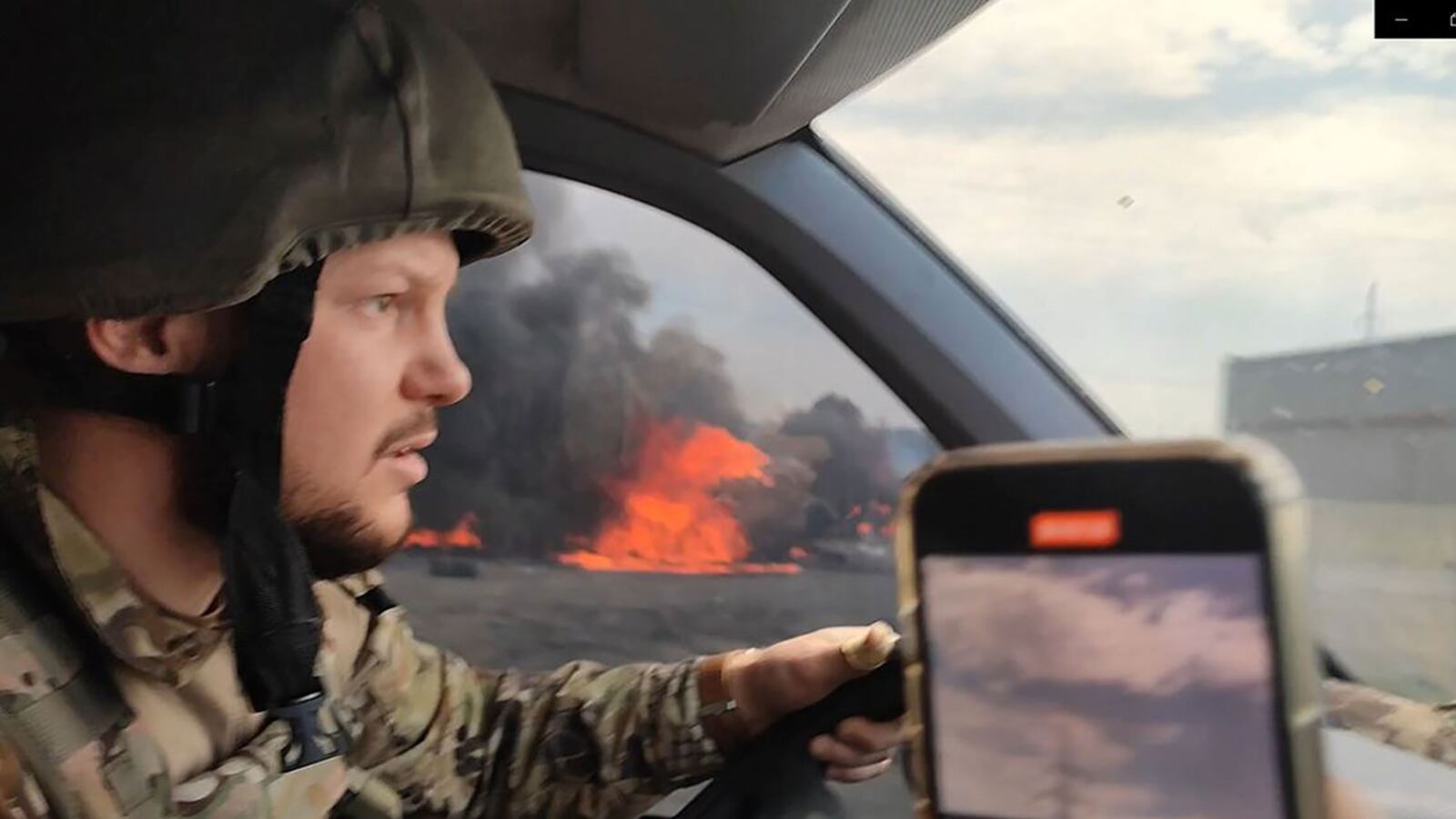LYSYCHANSK, Ukraine—The last road into the Ukrainian city of Luhansk was in flames. A huge bonfire raged on a parking space where a group of civilian and military vehicles had parked just minutes before. Anton, our military driver, pushed the accelerator to the floor as we drove past at around 140 kilometers an hour. As we zip down the road, three Ukrainian tanks roll the other way straight to the front line.
The tiny sliver of Luhansk Oblast still under Ukrainian control is now the center of the increasingly vicious war that is entering its fourth month. On all other fronts, such as Kyiv and Kharkiv, Ukraine has enjoyed a stream of crushing victories, relieving its two main cities from the hell of Russian shelling. But here in the Donbas, Russia’s grinding advance continues. The scaling-down of Russia’s war aims from a takeover of all Ukraine to an encirclement of Ukraine’s troops in this region is little comfort to the men and women who defend the front lines.
In the distance, plumes of smoke were rising from a series of artillery strikes on Ukrainian critical infrastructure in the area. “The Russians do in here just what they did in Mariupol… they just destroy the city block by block with artillery,” a tall, fair-haired Ukrainian major who goes by the nom de guerre ‘Spartak’ told The Daily Beast on a recent visit to the embattled urban sprawl. The 23-year-old from the western city of Lviv is now the deputy commander of a battalion that has been fighting on the front lines against Russia’s remorseless assault on the Donbas region of Eastern Ukraine. Soldiers usually avoid giving last names for operational security purposes.
As artillery thundered all around us, another one of the soldiers—a major called Roman—told us that “today is noticeably quiet here, because the Russian troops have taken Rubizhne near Severodonetsk and are now trying to reposition their forces. When they have done that, they will start again.”
It did not sound quiet to us. The constant boom of GRAD rocket launchers and howitzers filled the sky, and the impacts were close enough to shake the earth. Roman pulled out a map on his phone to show us the positions of the Russian forces. He was exhausted from three months of combat on this front, and is pessimistic about Ukrainian prospects in Luhansk. “If our situation doesn’t improve, we could be encircled here.”

Roman, a Ukrainian soldier who has been fighting on the frontlines against Russia’s remorseless assault on the Donbas region.
Tom MutchLike the rest of Vladimir Putin’s war, this offensive is not going entirely according to plan. In one of the biggest military blunders of the invasion, Russians forces recently tried to throw a pontoon bridge over the Siversky Donets river near Bilhorivka and encircle Ukrainian troops from behind. Ukrainian spotters picked them out and artillery pulverized them, destroying dozens of armored vehicles and killing up to 450 troops. Despite this, Russians continue to make slow and grueling, but very real, gains.
Roman is skeptical that relief is on its way. “It is my understanding that our goal here is to take the fire on us as much as possible to liberate Kharkiv, the Kherson direction,” he says with a sigh. “So, naturally we need to hold out here for some time.” A common complaint from commanders here is that they have no answer to Russia’s overwhelming artillery barrages, which could completely level a town and leave soldiers nowhere to take defensive positions. Western-supplied artillery is reaching the battlefield, but much slower than the Ukrainians would like.
There is no electricity and or running water, so they drink from a well and use head torches and candles for light. More crucially in an information war, there is no access to the outside world. Russian radio continually broadcasts propaganda about Russian advances throughout the country. At one point, Tatiana Malorezka, a resident, stopped and asked us: “What is going on? The Russians say they have captured Severodonetsk?!” When we reassure her that the Ukrainians still hold the city, her relief is palpable. “My nerves just can’t take it anymore, you know? I don’t want the Russians to be here!”
Tatiana said she could live under almost any circumstances without power or running water as long as it was under the Ukrainian flag. “I can never live under Russian occupation,” she told us. “It is the only thing that would make me leave.” She handed us three numbers of family members who have fled to western Ukraine. “Please call them and tell them that I and the rest of the family are OK,” she pleaded. One of the numbers was for her son, who is in the army and is fighting on the front line. She hasn’t been able to contact him and has no way to know if he is dead or alive.
Back in Slovyansk, we talk to Andrii, a soldier who is more upbeat about Ukraine’s chances in the region. “I think we will recapture Rubizhne soon,” he says. “They want to flank from Kharkiv to Luhansk and they want to go down south through Luhansk and those cities. I heard information from our intelligence agencies that the Russians are all demoralized. You must understand the reason. They are fighting only for money and the stupid idea that they are ‘liberators.’ They are not fucking liberators. We are fighting for our people and our land and that is why we will win.”
Ukrainian officials estimate that there are still thousands of civilians living in the Severodonetsk and Lysychansk urban areas in Luhansk Oblast. They mostly live underground in shelters and bunkers. On the outskirts of a school in Lysychansk is a building that the residents have converted into a shelter. What is most striking is the number of young people who have remained behind there—there are at least a dozen ranging from infants to older teenagers.

A blown out classroom in the school where the bunker is located.
Tom MutchToday, they say, there has been less shelling than before, and the residents have ventured outside. Sixteen-year-old Daniil, who was doing an apprenticeship to be a car mechanic before the war, says that they have barely left the basement in a month due to the shelling that has hit almost every building in Lysychansk—including their own. Upstairs, one of the parents shows us three rooms in the school. On the table of one of them are two massive shards of a rocket. The rooms almost look normal, but part of the roof is missing, and the supply closet is a wreck covered in rubble.
As we leave, we take three women who have decided to evacuate to the relative safety of Lysychansk in our car with us. One is 19-year-old Valeria, who was a university student in Kharkiv when the war broke out. Rather than fleeing the region altogether, she wants to go straight to her grandmother in Lysychansk to look after her. “My parents died when I was young, and she is all I have left,” Valeria says.

Valeria and her grandmother
Tom MutchWhen we ask her what she thinks of the war, she says that she “does not understand how this could happen. Why couldn’t the men… just sit down and figure out a way to avoid the war?” Our translator Oleksiy replies, “and how do you expect to be able to sit down with people who just want to kill us and get rid of Ukraine completely?”
At that moment, we hear a huge crack as shelling rains down on the city we just left, and Valeria stares silently out the window.





